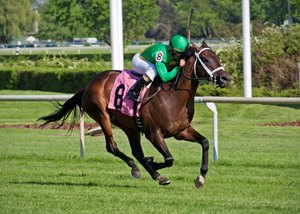NY Continues Hair Testing of Navarro, Servis Horses


Vet records collected by the New York State Gaming Commission are playing a key role as regulatory veterinarians there use hair samples to examine horses formerly trained by Jorge Navarro and Jason Servis, while Florida's Gulfstream Park this week has accepted entries for horses formerly conditioned by the two indicted trainers.
In March Navarro and Servis were indicted on federal charges related to the administration of performance-enhancing drugs in their horses. Before those horses are allowed to return to racing there, the New York regulator is looking at hair samples from the runners.
During a Grayson-Jockey Club Research Foundation online weekly seminar May 19, NYSGC equine medical director Scott Palmer talked about the importance of having the previous vet records as they examine the hair samples.
"Right now we're doing quite a bit of hair testing on horses that have been in the custody and control of trainers indicted for alleged use of illegal (substances)," Palmer said. "We're compiling a large number of test results on these horses."
While the New York regulator gathers that information, it is requiring owners provide vet records of the horses from December 2019 until the day they had their hair test done. Palmer added that if such records are not willingly provided, the regulator issues a subpoena for such records.
"What we're going to be doing is comparing those medical records, or treatment records, with our test results. If everything lines up, then there's no problem whatsoever," Palmer said. "But if we have evidence of a prescription drug in a horse and there is no prescription, or no veterinary record that a vet even gave them the drug, then that represents an area of exposure for that trainer for regulatory action."
In a follow up call with BloodHorse, Palmer explained that the hair testing is being done both to look at the horse's history and for its eligibility to race going forward. If an illegal substance is found in the horse's history, it potentially could result in sanctions. If it's still in the horse's system, of course, they would not be approved to return to racing.
Palmer said based on the conversations gathered from phone taps in the indictments, "We know that there was intent to influence these horses' performance with performance-enhancing substances of some kind. So let's do the hair testing in an effort to get a baseline of what's in there," Palmer said. "And the other part of it, to the best of our ability, we want to assure people that whatever beneficial effect that was achieved with a supposed alleged administration is no longer in effect, so this horse can go back to competing on a level playing field with everyone else."
When a horse is determined to be free of any such illegal substances, Palmer said the owner will be informed that the horse has been removed from the vet's list and is free to again compete. He said the regulator is still relatively early in the process. Belmont Park is scheduled to resume racing June 3.
Meanwhile, Gulfstream Park will allow some horses formerly trained by the indicted trainers to race this week. Michael Dubb, M and A Racing, and Bethlehem Stables' grade 3-placed Admiral Lynch, who was previously trained by Jason Servis, has been entered for the May 21 card. Admiral Lynch has been moved to Mike Maker.
The first two horses previously trained by Jorge Navarro have been entered May 22, both now trained by Todd Pletcher: Repole Stable's Cowboy Culture and Mac Nichol and Casie Coleman's Pick Up the Fone. Both of those horses have been running in claiming races of late, although Cowboy Culture won the 2017 Arlington Classic Stakes (G3T).

In March, The Stronach Group's chief veterinary officer, Dr. Dionne Benson, announced horses trained by Navarro and Servis would face a 60-day stand down in a track move—not a regulatory requirement—designed to protect the integrity of racing and the safety of the horses. TSG owns Gulfstream Park, Santa Anita Park and Golden Gate Fields in California, and Laurel Park and Pimlico Race Course in Maryland.
In order for a horse to be removed from the vet's list, a hair sample must be submitted for testing a minimum of 30 days after being transferred, and the horse must test clean for any prohibited substances, TSG said. At the conclusion of the 60 days, and with a negative hair test, the horse can work off the vet's list with approved medication for their jurisdiction and pass both a blood and urine test. Under normal circumstances, only a blood test is required when working off the vet's list.
"Our goal is to keep these horses safe and from competing if there is any possibility that they may have performance-enhancing drugs in their system," Benson said. "This is being done not only to first and foremost protect the horses, but also to protect the majority of the trainers and owners who are doing things properly. We are disgusted by the conduct set out in the indictments. It is extremely important to honor our commitment to always put the health and safety of the horse first."
While tracks and regulators are using hair tests to search for any indication of illegal substances, it should be noted that state regulatory bodies never called a single positive from a post-race test or an out-of-competition test for any of the substances the federal indictments accuse the trainers of using.
The three horses entered at Gulfstream Thursday and Friday have each been working regularly and each has worked at least once in May.
